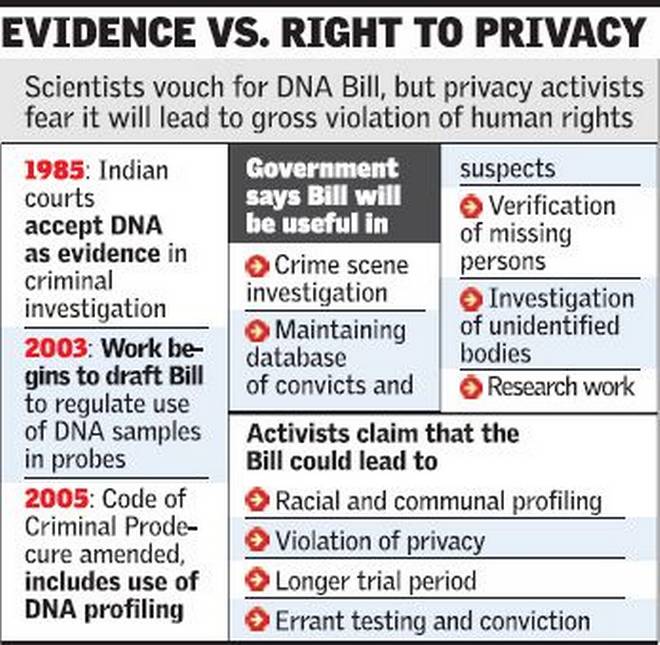The DNA Technology (Use and Application) Regulation Bill, 2019 22/07/2019 – Posted in: Blog
DNA TECHNOLOGY (USE AND APPLICATION) REGULATION BILL, 2019
For: Preliminary & Mains
Topics covered: All about the bill- need, significance, What is DNA, DNA Banks and Laboratories, Sample collection, Punishment, DNA Regulatory Board
News Flash
The DNA Technology (Use and Application) Regulation Bill, was tabled in the Lok Sabha.
- The bill seeks to control the use of DNA technology for establishing the identity of a person
- Currently, the use of DNA technology for identification of individuals is not regulated.
What is DNA?
- The DNA is a set of instructions found in a cell.
- DNA (Deoxyribonucleic acid) is a molecule composed of two chains to form a double helix carrying genetic instructions.
- It carries genetic instructions for the development, functioning, growth and reproduction of all known organisms and many viruses.
- DNA and ribonucleic acid (RNA) are nucleic acids.
- Nucleic acids are one of the four major types of macromolecules that are essential for all known forms of life.
About DNA Technology (Use and Application) Regulation Bill, 2019
Use of DNA Data
- The bill demands to allow DNA testing in respect of matters listed in the Schedule to the Bill.
- These include offences under the Indian Penal Code, 1860,
- and for civil matters such as parentage disputes, emigration or immigration, and transplantation of human organs.
- The Schedule includes DNA testing for matters related to the establishment of individual identity.
Collection of DNA
Authorities must obtain consent for collection in certain situations:
- For arrested persons, if the offence carries a punishment of up to seven years.
- If the offence carries more than seven years of imprisonment or death, consent is not required.
- If the person is a victim, or relative of a missing person, or a minor or disabled person, the authorities are required to obtain the written consent of such victim, or relative, or parent or guardian of the minor or disabled person.
In case, if the consent is not given in these cases, the authorities can approach a Magistrate who may order the taking of bodily substances of such persons.
DNA Data Bank
The Bill provides for the establishment of:
- National DNA Data Bank
- Regional DNA Data Bank
- DNA laboratories
DNA laboratories are required to prepare DNA data and share data with the National and Regional DNA Data Banks.
Data Bank is required to maintain data in the following categories:
- A crime scene index
- A suspects’ or undertrials’ index
- An offenders’ index
- A missing persons’ index
- An unknown deceased persons’ index.
Removal of DNA profiles
The Bill provides for the removal of the DNA profiles of the following persons:
- Of a suspect, if a police report is filed or court order was given
- Of an undertrial, if a court order is given
- On written request, for persons who are not a suspect, offender or undertrial, from the crime scene or missing persons’ index.
DNA Regulatory Board
- The Bill provides for the establishment of a DNA Regulatory Board.
- The Board will supervise the DNA Data Banks and DNA laboratories.
- The Secretary, Department of Biotechnology, will be the ex officio Chairperson of the Board.
- Other members of the board are includes:
- Experts in the field of biological sciences
- Director-General of the National Investigation Agency
- Director of the Central Bureau of Investigation.
Functions of the Board
- Advising governments on all issues related to establishing DNA laboratories or Data Banks
- Granting accreditation to DNA laboratories.
- Board ensures the DNA profile with data banks are safe and confidential.
Penalities
The Bill specifies penalties for offences, including:
- for disclosure of DNA information, or
- using DNA sample without authorization.
Disclosure of DNA information will be punishable with imprisonment of up to three years and fine of up to one lakh rupees.
Source: PRS India
You can follow us on LinkedIn and on Instagram (Diligent IAS) for more updates related to IAS Preparation/ Study Material, Subscribe to our Facebook Page and Youtube Channel- Diligent IAS

